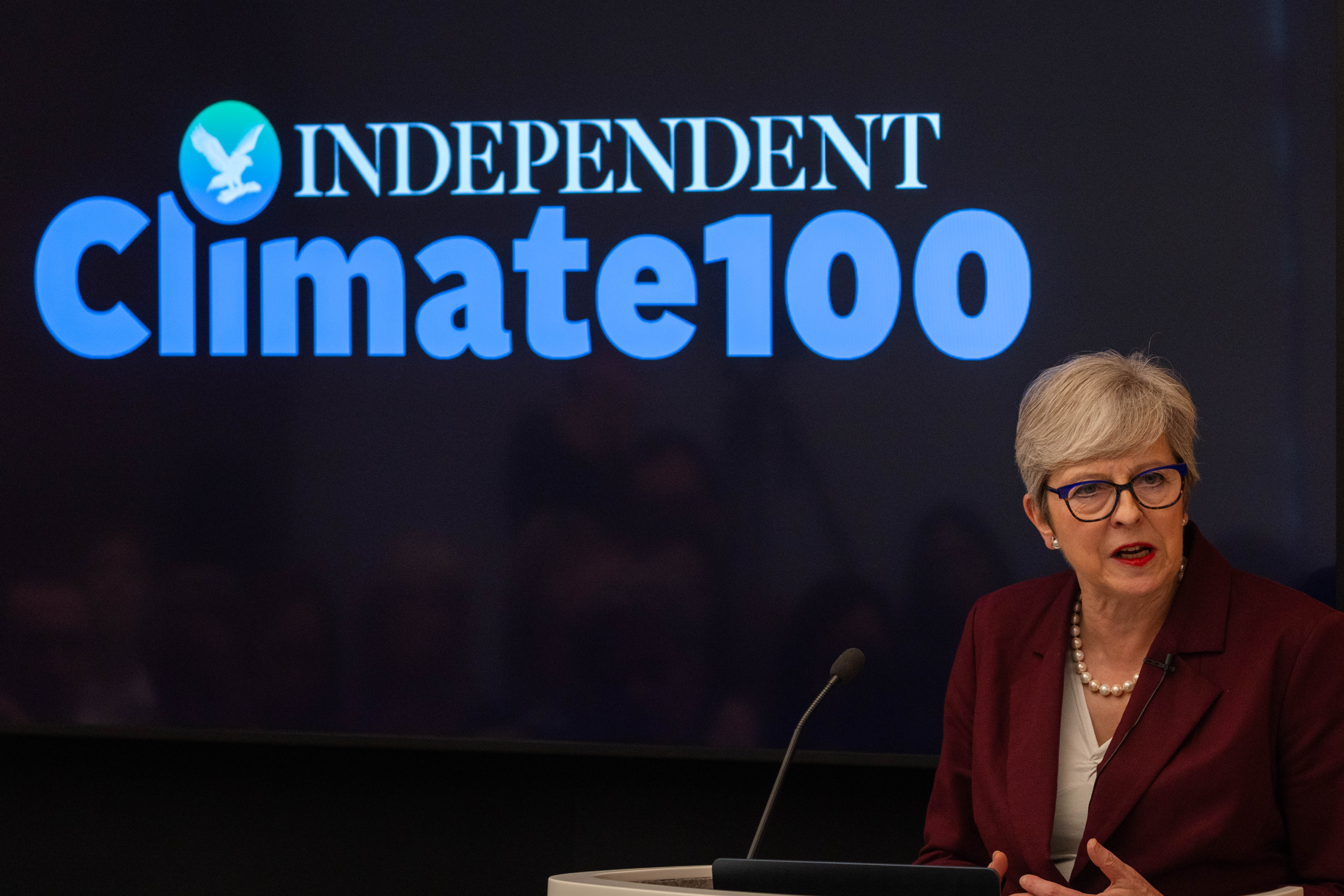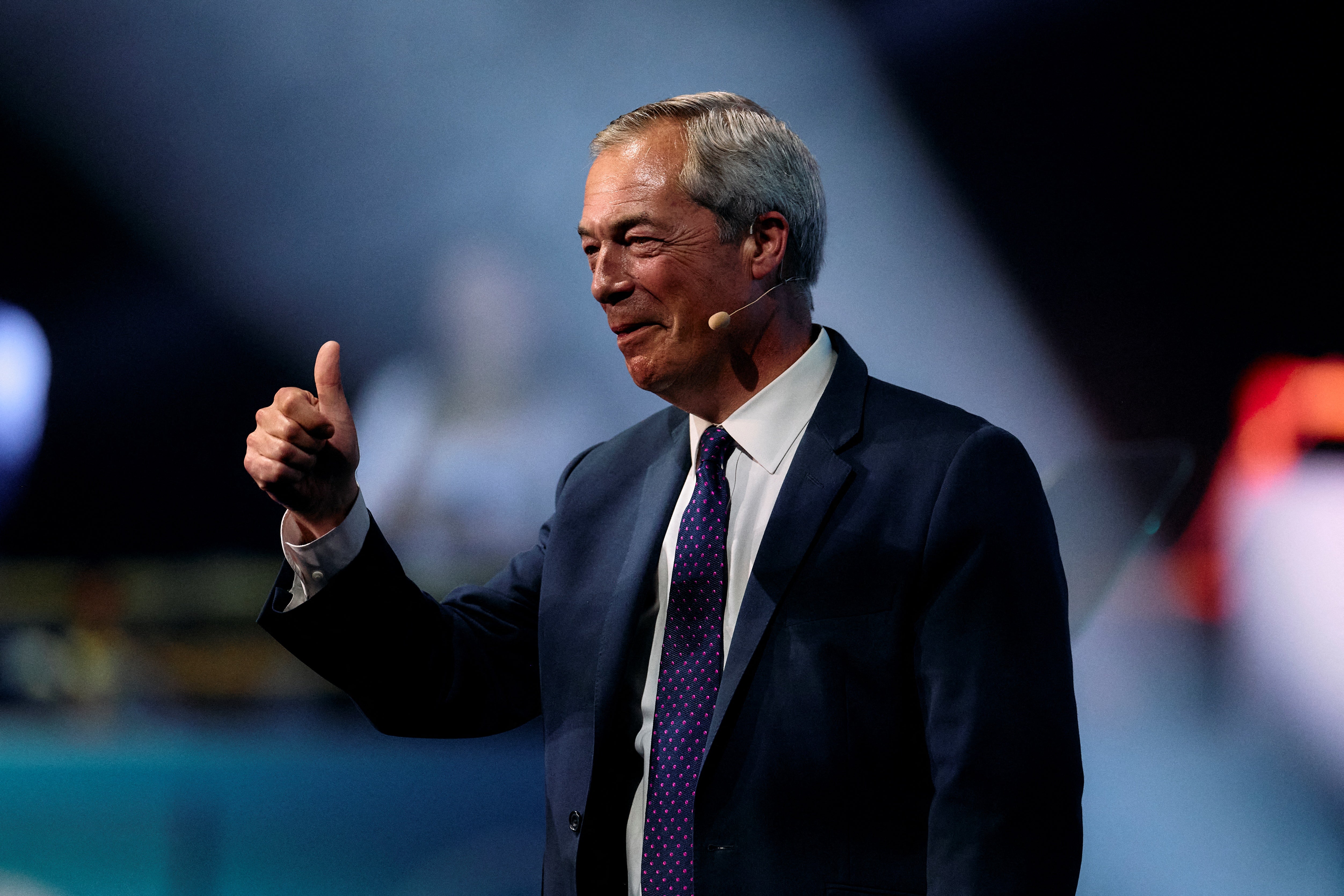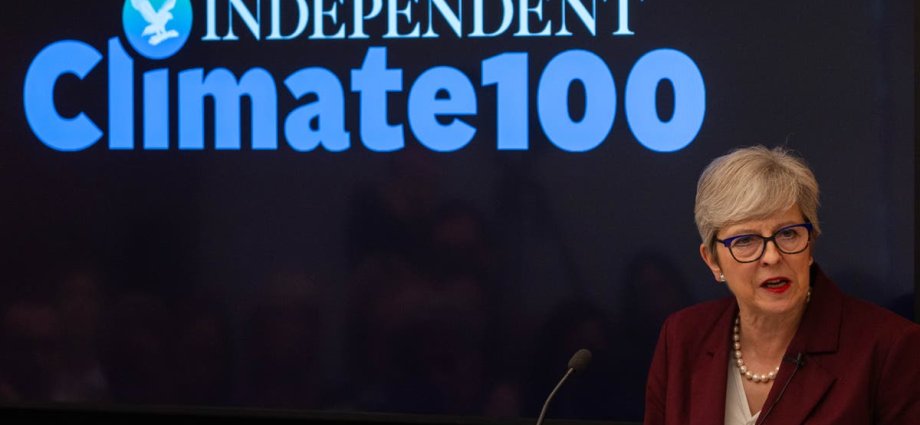Theresa May has launched a blistering attack on Donald Trump and other leading right-wing politicians including Nigel Farage and Marine Le Pen over their climate-change denial.
In a wide-ranging speech in New York, Baroness May also warned that the climate crisis is now fuelling the cruelty and criminality of the modern slave trade.
The former prime minister was giving the keynote speech at The Independent’s Climate 100 event, as world leaders including British prime minister Sir Keir Starmer gathered in New York for the United Nations General Assembly.
Baroness May’s anger at those like Trump and Mr Farage who describe climate change as a “hoax” or a “scam” echoes warnings made ahead of the Climate 100 event in a powerful intervention by the Archbishop of Canterbury, Justin Welby.

As Tory chair in 2002, after a second humiliating defeat to Tony Blair, Ms May famously delivered a warning to the Conservatives that they had “become the nasty party” by turning their backs on the issues that resonated with ordinary voters.
Her attack on Trump and Mr Farage also includes an implied criticism of her own party, where the four leadership candidates have all moved towards Reform, pulling away from green policies like those she championed in government.
She made a passionate appeal for leaders to take the climate crisis seriously, not just to save the planet but also for the sake of humanity.
She raged against “those who pit ‘the people’ against an out-of-touch elite”, accusing them of using the climate change debate “to fight a culture war”.

Turning her fire on Trump, whom she met at the White House as prime minister and held hands with as she walked down the stairs, Baroness May said: “Here in the United States, action on climate change is already a feature of the upcoming presidential election, with one of the two main candidates promising to repeal recent climate legislation and ramp up drilling for fossil fuels.
“It’s a position arising partly from a long-held conspiracy theory that climate change is a ‘hoax’.”
The intervention comes just weeks away from the US election, in which Trump will stand against current vice-president Kamala Harris as he attempts to return to the White House.
The Independent’s Climate 100 event marks the launch of the Climate 100 List, a roll call of leading climate activists, innovators, scientists, business leaders, creators, policymakers and entrepreneurs from around the world, selected by The Independent.
At a time when Sir Keir is focused on delivering economic growth, Baroness May reminded her audience and the wider political class that green policies are positive forces for economic growth and job creation, not a cost imposed on the taxpayer.
“Despite the opportunities ahead of us, our aspirations of transitioning our economies towards sustainability are increasingly under attack – particularly in Western democracies.”

Baroness May cited the type of rhetoric used by Marine Le Pen, who narrowly failed to win in France’s recent parliamentary elections, and Alternative for Germany (AfD), who could end up sharing power in the German parliament after next year’s general election.
“Those of us who advocate accelerating our progress towards net zero emissions are labelled fanatics and zealots. Ironically, the name-calling often emanates from ideologues at the political extremes or from populists who offer only easy answers to complex questions.
“Those who drive wedge issues that seek to divide us. Who crave deeper polarisation in our societies in order to rally support for their cause.”
But her ire was also focused on Britain and the rise of Mr Farage’s Reform UK, with its intent to undermine attempts to tackle climate change.
“In my own country, climate change has become politicised by some on the right of British politics. We saw in the recent general election how the Reform party campaigned on a platform of opposing the UK’s climate objectives.

“It framed net zero as a cost imposed from on high that threatens livelihoods and will send jobs abroad.”
Baroness May highlighted how important the Climate 100 event is in terms of making the case for action.
“Well done to The Independent for its leadership in this area, not just today, but for placing climate change and environmental concerns at the core of its journalism for many years,” she said.
But she warned: “Let’s face it: we have been talking about this for years, and still we are not achieving the change we need. In many ways, the term ‘climate change’ has just become another part of the everyday language of politicians, used so often that people forget what it really means. Dismiss it from their thinking, get on with life, think: ‘It doesn’t mean anything to me – and in any case, someone else will have to sort it out.’
“The onus is on those in the political centre ground to provide due challenge.
“When the sceptics say that the green transition will cripple business, we say they could not be more wrong. Study after study shows that the transition to renewable energy will unlock global market opportunities worth trillions of dollars over the next decade alone – with businesses in every world region able to capitalise.”
She added: “When the critics say transitioning to renewables costs too much, we say it’s wrong to see it as a cost. It’s an enormous investment opportunity for the private sector, where, over time, the economic returns far outstrip the investment required.”
But more than the economics and the need to save the planet, Baroness May was concerned about the immediate impact on humanity. She noted that she had witnessed climate change on her holidays to Switzerland with her husband Sir Philip.
“When we stand at Rotenboden above Zermatt, we see the retreat of the glaciers. And this year, there was so much rainfall in June that it caused flooding in the village, and brought about landslips that closed the railway down the valley.
“I’m told that the replacement buses alone cost 1 million Swiss francs, let alone the cost of the repair work to this vital transport artery.”
But the most troubling stories come from the way in which the climate crisis is fuelling modern slavery.
As home secretary and prime minister, Ms May was responsible for taking on the scourge of modern slavery, which affects millions around the globe. She also brought in some of the most far-reaching reforms on clean air, and instigated a 25-year environment plan.
Her stark warning to those gathered in the audience and beyond was that the evil trade in human beings is being fuelled by the climate crisis and the despair it creates.
“Climate change has and will lead some to poverty and desperation.
“Some of the most dire outcomes of climate change are humanitarian. When extreme weather events destroy homes and livelihoods, when harvests fail, when water supplies dry up, when sea levels destroy communities, and when political instability and conflict take hold, people are often left destitute – with no roof over their head, no economic security, no reliable means to feed their families, and no support network.
“Life becomes a matter of survival from one day to the next, and into that picture come the criminal gangs making money out of human suffering. Because these situations make people more vulnerable to being trafficked and taken into slavery.”
She told of the harrowing tales that had crossed her desk – of a 53-year-old Romanian electrician, a girl she called Jane who was forced into the sex industry, and a seven-year-old girl used as a slave and forced to sleep with the dogs.
She said: “These are stories from the UK and the USA, but slavery is worldwide. In nine years, one safe house in London has taken in women from 50 different countries.”
Baroness May founded and chairs the Global Commission on Modern Slavery and Human Trafficking, which brings together influential figures from politics, civil society, business and academia to restore lost political momentum in addressing this issue.
She said: “The World Bank estimates that, by 2050, a further 143 million people will have been forced from their homes in Africa, south Asia and Latin America because of climate change. It will contribute to a global migration phenomenon that far surpasses anything we are experiencing today.
“So the window of opportunity is closing to act on climate change, to preserve our planet, and to alleviate human suffering.”











